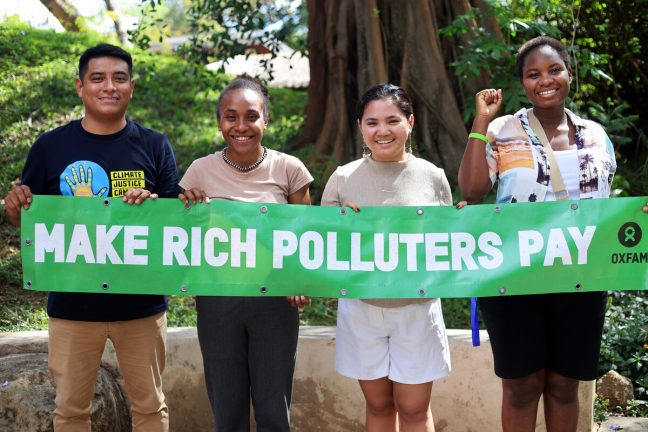Why curbing the excessive emissions of an elite few can create a sustainable planet for all
The climate crisis is deeply connected to inequality.
The world’s richest are disproportionately responsible for the climate crisis, and the poorest are bearing the brunt of its devastating effects.
Oxfam’s new ‘Carbon Inequality Kills’ report reveals the stark reality of carbon inequality and its consequences for our planet.
Our analysis shows billionaires emit more carbon pollution in 90 minutes than the average person does in a lifetime.
The richest 1% of the global population are responsible for 16% of emissions, which is more than the poorest two-thirds of humanity combined.
The consumption and the investments in fossil fuel corporations of the richest billionaires are driving the unsustainable levels of emissions we see today.
Take billionaire’s luxury travel as an example. A superyacht owned by a billionaire can be equivalent to the emissions of over 800 average people in a year.
Here in Australia, the emissions from billionaire’s super yachts and private jets in one hour is equal to what an average Australian emits in an entire year.
Big polluting corporations need to pay
Mining Magnate Clive Palmer emits over 5000 tons of carbon pollution per year from his luxury transport alone. Greta Packer, whose family became ultra wealthy from Casinos, emits over nearly 8500 tons of carbon from her super-yacht travel.
Nearly 40 percent of billionaire investments analysed in Oxfam’s research are in highly polluting industries: oil, mining, shipping and cement.
Big polluting corporations and their billionaire owners have created the climate crisis and are getting off scot-free. Meanwhile, Pacific and other communities impacted by climate disasters are paying the price. It’s simply unfair.
Already, the emissions of the super-rich are locking in climate change-related economic losses in the trillions of dollars globally, contributing to devastating crop losses, and leading to millions of excess deaths.
Droughts and famine in Africa, floods in Bangladesh, cyclones in Vanuatu – all are being made worse by climate change.
Emissions from the richest 1% have already caused crop losses that could have fed 14.5 million people per year between 1990 and 2023. This is projected to rise to 46 million people per year between 2023 and 2050.
Four years (2015-2019) of emissions from the richest 1% will cause 1.5 million excess deaths from heat between 2020 and 2120. This is more than the current annual death toll from disasters.
What about the richest Australians?
The richest 10% in Australia emitted 31% of national consumption emissions between 1990 and 2019. The emissions of the wealthiest 1% of Australians during that time are enough to cause $243bn in economic damage globally between 1990 and 2050.
While Australia is experiencing some climate impacts, the loss of Gross Domestic Product(GDP) will be 5 times higher in the Pacific than in Australia.
At the United Nations climate talks in November this year, countries are negotiating a new global climate finance goal that developed countries, like Australia, would pay to low-income countries to support them to act on climate change and respond to climate disasters.
This is the most important agreement in years and will define whether we can get on track to limit warming to 1.5 degrees, and whether countries and communities, who have done little to cause the crisis, are compensated for climate change impacts.
Ahead of these talks, its critical we put pressure on Climate Change Minister Chris Bowen to support a strong climate finance goal for low-income countries, and to ensure Australia and other countries can meet that goal by making the big polluters, who make billions in profits, pay to fix the climate crisis.

